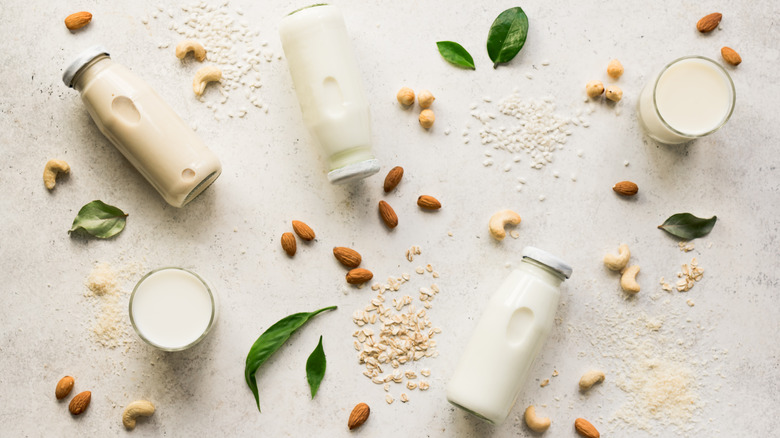What Is Hazelnut Milk And Is It Good For You?
Among the many nut- and plant-based milks on the market today is hazelnut milk. Although you may automatically think of almond, coconut, or even oat milk when you hear about plant-based drinks, hazelnut milk should definitely make the top of the list — it is incredibly nutritious and provides numerous health benefits, as per Men's Journal.
While you can certainly find hazelnut milk sold in stores, A Beautiful Plate points out that this milk consists of just a handful of ingredients if you're looking to whip it up yourself at home. All you need is a 3/4 cup of hazelnuts, 3.5 cups of water, and 1/4 teaspoon of vanilla extract. A high-powered blender and a fine-mesh sieve will give you a tall, creamy glass of milk in no time.
Hazelnut milk can be used as you would any other type of milk, whether plant-based or dairy. You can add it to a bowl of cereal, splash some in your morning coffee, or use it in cooking recipes. It will deliver a nutritious punch in any form as it contains many essential vitamins and minerals, including folic acid, B vitamins, vitamin E, and omega-3 fatty acids (via Men's Journal). If you're sensitive to gluten, lactose, or soy, you have no need to worry as this beverage is free of all three. Finally, a cup of hazelnut milk will only set you back about 70 calories for the day, which can be great for those looking to reduce calorie consumption.
Plant-based milks have more benefits than you think
It makes sense that hazelnut milk has become a widely procured alternative to dairy milk, given that plant-based milks have been rising in popularity in recent years, as per a 2016 review in the Journal of Food Science and Technology. Increasingly more people are consuming plant-based beverages due to an intolerance or allergy to lactose and other components of dairy milk, as well as concerns regarding calorie consumption and the ethics and environmental impact of the dairy industry. This review found that although the nutritional benefits of plant-based milks vary depending on the type, they can serve as a nutritionally equivalent alternative to dairy milk when properly fortified, processed, and preserved.
The New York Times addressed the benefits of plant-based milks with a number of health professionals, including Walter Willett, a professor at the Harvard School of Public Health. The professor recommends soy milk as the best alternative to dairy milk when considering protein content. Other nut milks, including peanut, almond, walnut, cashew, macadamia, and hazelnut, deliver a good dose of heart-healthy unsaturated fats while keeping calories low. Those who prefer oat milk will benefit from some additional dietary fiber.
One Green Planet outlines several more benefits of plant-based milks. They are generally low in sugar, especially when no additional sugar has been added, provide a hefty dose of calcium, are easy to digest, and don't contain hormones found in dairy milk, which can cause potentially harmful insulin spikes in the body.


